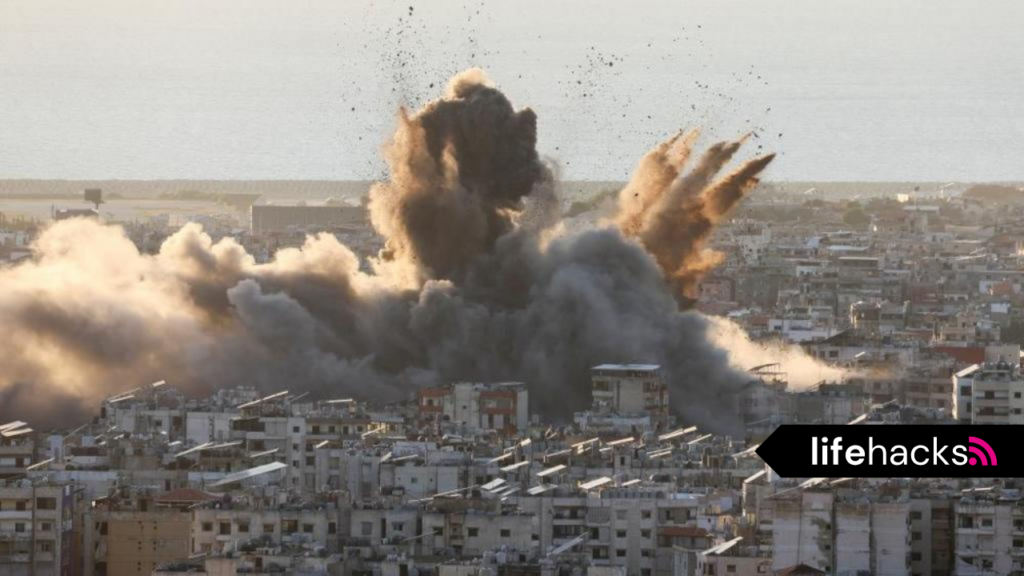Israeli Prime Minister Benjamin Netanyahu has threatened to carry out his government’s military objectives in response to a drone strike on his private property in Caesarea, marking a startling increase in hostilities in the region. As tensions in the unstable region continue to rise, the attack, which took place early on Saturday morning, has alarmed both the international community and Israel.

Table of Contents
ToggleAttack Details
The Prime Minister and his spouse were not present when the drone attack occurred, so no one was hurt, according to sources from Netanyahu’s office. After the drone, which was allegedly fired from Lebanon, struck a building in Caesarea, Israeli security forces reacted right away. Netanyahu stated his intention to take firm action against the individuals responsible for this attempted attack, even though he denounced the crime.
Netanyahu stressed in his address that “the proxies of Iran who tried to assassinate me and my wife made a bitter mistake.” The Prime Minister has long opposed Iranian influence in the area, which he has described as posing a serious threat to Israel’s national security. This sentiment highlights his attitude on this issue.
Hezbollah's Involvement
The Iranian-backed militant organization Hezbollah, which is based in Lebanon, is thought to have been involved in the drone strike. Since the Hamas strikes on October 7, Israel and Hezbollah have been engaged in growing hostilities that have resulted in a significant escalation of hostilities. Israel’s armed forces have launched a string of counterattacks against targets affiliated with Hezbollah, indicating a readiness to take on threats from all angles.
Israel began attacking Hezbollah strongholds in southern Lebanon with airstrikes a few weeks ago, as the situation escalated. According to reports, Hezbollah fighters were killed when Israeli forces targeted the organization’s military installations and supplies. Israel’s strategic goal, as Netanyahu has highlighted in several national addresses, is to neutralize threats posed by both Hamas and Hezbollah. This current military effort reflects that goal.
Regional Tensions
The drone strike occurs during a period of increased tension in the area, when disputes are becoming more intertwined. Israel has conducted massive military operations in Gaza after the October 7 attacks, claiming to be targeting Hamas and other militant organizations that are accountable for the violence. But because of the large number of civilian deaths caused by these strikes, human rights organizations have widely condemned them and called for more restraint.
Many attacks against Gaza’s civilian infrastructure, including apartment complexes and hospitals, have been carried out by the Israeli force. Over 50 people have died as a result of these attacks in less than 24 hours, according to local health experts, exacerbating the region’s already serious humanitarian catastrophe. More than a million people have been forced to flee Gaza due to continued military operations that worsen the misery of residents, according to a warning from the UN.
Also Recommended Read : Israel marks anniversary of Hamas attacks as Middle East War Rages
International Reactions
The international community has expressed increasing concern over the potential for a broader regional conflict. US Defense Secretary Lloyd Austin has called for all parties to exercise restraint and minimize civilian casualties, emphasizing the importance of protecting non-combatants amid the escalating violence.
A number of nations have called on Israel to reevaluate its military strategies in Gaza in light of the recent events, stressing the humanitarian consequences of its actions. The UN has issued urgent appeals for humanitarian aid to be permitted into Gaza in order to help the millions of people impacted by the violence, indicating that the situation is approaching crisis levels.
Furthermore, this conflict’s effects go beyond the surrounding area. Iran, a major backer of Hamas and Hezbollah, has been linked to the current conflict by giving these organizations tactical and military direction. Concerns are raised by this relationship regarding the possibility of a bigger conflict involving Iran and its allies, which would destabilize the Middle East as a whole.
Looking Ahead
Netanyahu is unwavering in his dedication to Israel’s security as things continue to change. Both domestic and foreign onlookers will be intently following his administration’s response to the drone attack and ongoing fighting. The Prime Minister’s words indicate that he is determined to take on not only Hezbollah but also the larger Iranian influence in the area, which he sees as the main danger to Israeli security.
The Israeli government must strike a balance between its military goals and the humanitarian requirements of the conflict’s impacted civilian population in the face of growing international demand to defuse the bloodshed. Millions of people have been displaced by the ongoing conflict, which has already taken thousands of lives, and there is still a good chance that it will get worse.
The world will continue to watch Israel as it negotiates this challenging terrain, paying close attention to what it does and how Hezbollah and other terrorist organizations react. Since the situation is unstable, what happens in the next few days will have a significant impact on how the war develops in the future and how it affects regional stability.